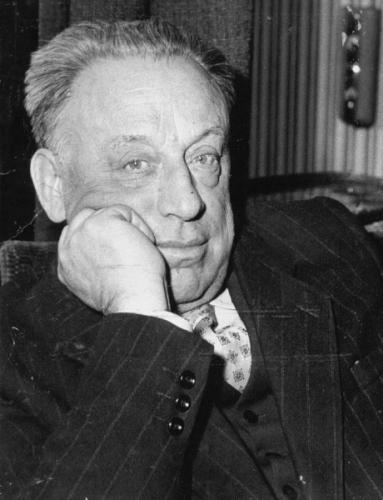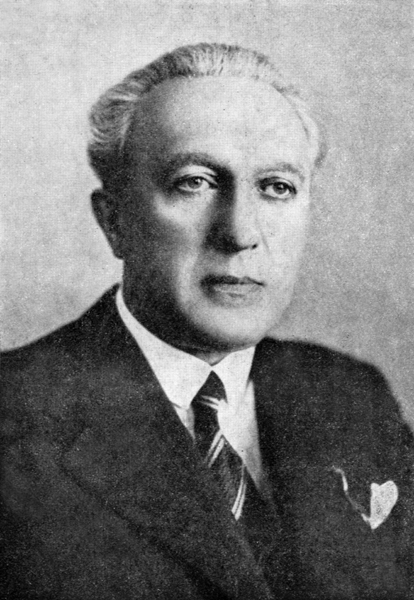|
Tadeusz Szeligowski
Tadeusz Szeligowski (13 September 1896 - 10 January 1963) was a Polish composer, educator, lawyer and music organizer. His works include the operas ''The Rise of the Scholars'', ''Krakatuk'' and ''Theodor Gentlemen'', the ballets ''The Peacock and the Girl'' and ''Mazepa ballets'', two violin concertos, chamber and choral works. As a music teacher, Szeligowski was very well established in Vilnius, Lublin, Poznań and Warsaw. He was also a respected music writer who frequently wrote for journals and magazines specialized in music such as the ''Kurier Wileński'', '' Tygodnik Wileński'', '' Muzyka'' and the '' Kurier Poznański''. His achievements include the creation of the Poznan´ Philharmonic, where he served as its first director between the years 1947-1949, and the founding of the Poznań Musical Spring, one of the most important festivals of contemporary music at the time. Life and work Musical education Tadeusz Szeligowski was born on 13 September 1896 in Lemberg, then ... [...More Info...] [...Related Items...] OR: [Wikipedia] [Google] [Baidu] |
Lemberg
Lviv ( uk, Львів) is the largest city in Western Ukraine, western Ukraine, and the List of cities in Ukraine, seventh-largest in Ukraine, with a population of . It serves as the administrative centre of Lviv Oblast and Lviv Raion, and is one of the main Ukrainian culture, cultural centres of Ukraine. It was named in honour of Leo I of Galicia, Leo, the eldest son of Daniel of Galicia, Daniel, King of Ruthenia. Lviv emerged as the centre of the historical regions of Red Ruthenia and Galicia (Eastern Europe), Galicia in the 14th century, superseding Halych, Chełm, Belz and Przemyśl. It was the capital of the Kingdom of Galicia–Volhynia from 1272 to 1349, when it was conquered by King Casimir III the Great of Poland. From 1434, it was the regional capital of the Ruthenian Voivodeship in the Crown of the Kingdom of Poland, Kingdom of Poland. In 1772, after the First Partition of Poland, the city became the capital of the Habsburg Kingdom of Galicia and Lodomeria. In 1918, f ... [...More Info...] [...Related Items...] OR: [Wikipedia] [Google] [Baidu] |
Poznań Philharmonic
Tadeusz Szeligowski Poznań Philharmonic is a regional cultural institution founded in 1947 on the initiative of Tadeusz Szeligowski as the State Philharmonic in Poznań; one of the two philharmonics in the Greater Poland Voivodeship. History The inauguration of the Philharmonic's activities took place on 10 November 1947 under the direction of Stanisław Wisłocki. Since March 1950, the Poznań Nightingales Choir, headed by Stefan Stuligrosz, has been operating at the Philharmonic. The Philharmonic is connected with Polish contemporary music festivals "Poznań Spring", another initiative of Szeligowski. The concert hall of the Philharmonic is the Hall of the Adam Mickiewicz University, considered to be one of the best in terms of acoustics in Poland. Over the years, the philharmonic orchestra has been led by Jerzy Katlewicz, Robert Satanowski, Witold Krzemieński, Zdzisław Szostak, Renard Czajkowski, Wojciech Rajski, Wojciech Michniewski, Andrzej Borejko, Mirosław ... [...More Info...] [...Related Items...] OR: [Wikipedia] [Google] [Baidu] |
George Enesco
George Enescu (; – 4 May 1955), known in France as Georges Enesco, was a Romanian composer, violinist, conductor and teacher. Regarded as one of the greatest musicians in Romanian history, Enescu is featured on the Romanian five lei. Biography Enescu was born in Romania, in the village of Liveni (later renamed "George Enescu" in his honor), then in Dorohoi County, today Botoșani County. His father was Costache Enescu, a landholder, and his mother was Maria Enescu (née Cosmovici), the daughter of an Orthodox priest. Their eighth child, he was born after all the previous siblings had died in infancy. His father later separated from Maria Enescu and had another son with Maria Ferdinand-Suschi: the painter Dumitru Bâșcu. A child prodigy, Enescu began experimenting with composing at an early age. Several, mostly very short, pieces survive, all for violin and piano. The earliest work of significant length bears the title ''Pămînt românesc'' ("Romanian Land"), and is i ... [...More Info...] [...Related Items...] OR: [Wikipedia] [Google] [Baidu] |
Sergei Prokofiev
Sergei Sergeyevich Prokofiev; alternative transliterations of his name include ''Sergey'' or ''Serge'', and ''Prokofief'', ''Prokofieff'', or ''Prokofyev''., group=n (27 April .S. 15 April1891 – 5 March 1953) was a Russian composer, pianist, and conductor who later worked in the Soviet Union. As the creator of acknowledged masterpieces across numerous music genres, he is regarded as one of the major composers of the 20th century. His works include such widely heard pieces as the March from ''The Love for Three Oranges,'' the suite ''Lieutenant Kijé'', the ballet ''Romeo and Juliet''—from which "Dance of the Knights" is taken—and ''Peter and the Wolf.'' Of the established forms and genres in which he worked, he created—excluding juvenilia—seven completed operas, seven symphonies, eight ballets, five piano concertos, two violin concertos, a cello concerto, a symphony-concerto for cello and orchestra, and nine completed piano sonatas. A graduate of the ... [...More Info...] [...Related Items...] OR: [Wikipedia] [Google] [Baidu] |
Paris
Paris () is the capital and most populous city of France, with an estimated population of 2,165,423 residents in 2019 in an area of more than 105 km² (41 sq mi), making it the 30th most densely populated city in the world in 2020. Since the 17th century, Paris has been one of the world's major centres of finance, diplomacy, commerce, fashion, gastronomy, and science. For its leading role in the arts and sciences, as well as its very early system of street lighting, in the 19th century it became known as "the City of Light". Like London, prior to the Second World War, it was also sometimes called the capital of the world. The City of Paris is the centre of the Île-de-France region, or Paris Region, with an estimated population of 12,262,544 in 2019, or about 19% of the population of France, making the region France's primate city. The Paris Region had a GDP of €739 billion ($743 billion) in 2019, which is the highest in Europe. According to the Economist Intelli ... [...More Info...] [...Related Items...] OR: [Wikipedia] [Google] [Baidu] |
Doctorate
A doctorate (from Latin ''docere'', "to teach"), doctor's degree (from Latin ''doctor'', "teacher"), or doctoral degree is an academic degree awarded by universities and some other educational institutions, derived from the ancient formalism ''licentia docendi'' ("licence to teach"). In most countries, a research degree qualifies the holder to teach at university level in the degree's field or work in a specific profession. There are a number of doctoral degrees; the most common is the Doctor of Philosophy (PhD), awarded in many different fields, ranging from the humanities to scientific disciplines. In the United States and some other countries, there are also some types of technical or professional degrees that include "doctor" in their name and are classified as a doctorate in some of those countries. Professional doctorates historically came about to meet the needs of practitioners in a variety of disciplines. Many universities also award honorary doctorates to individuals d ... [...More Info...] [...Related Items...] OR: [Wikipedia] [Google] [Baidu] |
Jagiellonian University
The Jagiellonian University (Polish: ''Uniwersytet Jagielloński'', UJ) is a public research university in Kraków, Poland. Founded in 1364 by King Casimir III the Great, it is the oldest university in Poland and the 13th oldest university in continuous operation in the world. It is regarded as Poland's most prestigious academic institution. The university has been viewed as a guardian of Polish culture, particularly for continuing operations during the partitions of Poland and the two World Wars, as well as a significant contributor to the intellectual heritage of Europe. The campus of the Jagiellonian University is centrally located within the city of Kraków. The university consists of thirteen main faculties, in addition to three faculties composing the Collegium Medicum. It employs roughly 4,000 academics and provides education to more than 35,000 students who study in 166 fields. The main language of instruction is Polish, although around 30 degrees are offered in Engli ... [...More Info...] [...Related Items...] OR: [Wikipedia] [Google] [Baidu] |
Zdzisław Jachimecki
Zdzisław Jachimecki ( Lwów, 7 July 1882 – 27 October 1953, Kraków) was a Polish historian of music, composer, professor at the Jagiellonian University and the Kraków Music Academy, and member of the Polish Academy of Learning. Life Born in Lwów in 1882, in 1904–5 he studied counterpoint with Arnold Schönberg in Vienna.See Jachimecki's account in the album, ''Dem Lehrer Arnold Schönberg'', at the Arnold Schönberg Center, Vienna. Partial bibliography * '' Mozart. W 150 rocznicę urodzin'' (1906) * '' Hugo Wolf'' (1908) * '' Józef Haydn'' (1910) * '' Ryszard Wagner'' (1911) * ''Wspomnienia Kurpińskiego'' (1911) * ''Artega i Wagner jako teoretycy dramatu muzycznego'' (1912) * ''Muzyka na dworze króla Władysława Jagiełły, 1424–1430'' (1915) * '' Moniuszko'' (1921) * ''Fryderyk Chopin'' (1927) * ''Na marginesie pieśni studenckiej z XV-go wieku'' (1930) * ''Nieuwzględnione dotychczas źródło melodii Bogurodzicy'' (1930) * ''Średniowieczne zabytki polsk ... [...More Info...] [...Related Items...] OR: [Wikipedia] [Google] [Baidu] |
Musicology
Musicology (from Greek μουσική ''mousikē'' 'music' and -λογια ''-logia'', 'domain of study') is the scholarly analysis and research-based study of music. Musicology departments traditionally belong to the humanities, although some music research is scientific in focus (psychological, sociological, acoustical, neurological, computational). Some geographers and anthropologists have an interest in musicology so the social sciences also have an academic interest. A scholar who participates in musical research is a musicologist. Musicology traditionally is divided in three main branches: historical musicology, systematic musicology and ethnomusicology. Historical musicologists mostly study the history of the western classical music tradition, though the study of music history need not be limited to that. Ethnomusicologists draw from anthropology (particularly field research) to understand how and why people make music. Systematic musicology includes music theory, aesthe ... [...More Info...] [...Related Items...] OR: [Wikipedia] [Google] [Baidu] |
Bolesław Wallek-Walewski
Bolesław Wallek-Walewski (born 23 January 1885 in Lviv, died 9 April 1944 in Kraków) was a Polish composer and conductor, lecturer and Director of the Conservatory of Music in Kraków. From 1894 Bolesław Wallek-Walewski studied at the Galician Music Society Conservatory in L'vov under guidance of theory professor Stanislaw Niewiadomski, from 1900 to 1904 under Władysław Żeleński and Felicjan Szopski at the Conservatory of the Music Society in Kraków, and then between 1906 and 1907 with Hugo Riemann in Leipzig. From 1908 he became professor at the Conservatory in Kraków Institute of Music and from 1910 at the Conservatory in Kraków. References External links Scores by Bolesław Wallek-Walewskiin digital library Polona Polona is a Polish digital library, which provides digitized books, magazines, graphics, maps, music, fliers and manuscripts from collections of the National Library of Poland and co-operating institutions. It began its operation in 2006. Colle ... ... [...More Info...] [...Related Items...] OR: [Wikipedia] [Google] [Baidu] |
Kraków
Kraków (), or Cracow, is the second-largest and one of the oldest cities in Poland. Situated on the Vistula River in Lesser Poland Voivodeship, the city dates back to the seventh century. Kraków was the official capital of Poland until 1596 and has traditionally been one of the leading centres of Polish academic, economic, cultural and artistic life. Cited as one of Europe's most beautiful cities, its Old Town with Wawel Royal Castle was declared a UNESCO World Heritage Site in 1978, one of the first 12 sites granted the status. The city has grown from a Stone Age settlement to Poland's second-most-important city. It began as a hamlet on Wawel Hill and was reported by Ibrahim Ibn Yakoub, a merchant from Cordoba, as a busy trading centre of Central Europe in 985. With the establishment of new universities and cultural venues at the emergence of the Second Polish Republic in 1918 and throughout the 20th century, Kraków reaffirmed its role as a major national academic and a ... [...More Info...] [...Related Items...] OR: [Wikipedia] [Google] [Baidu] |







.jpg)


